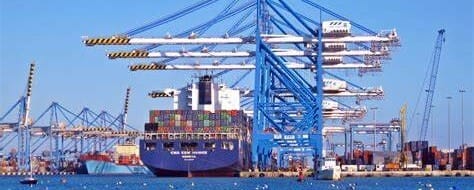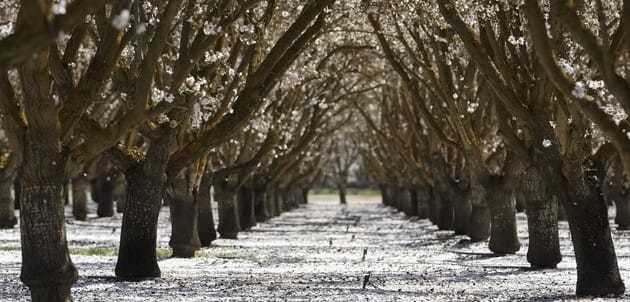- Adam Gray Valley Solutions
- Posts
- Valley Headlines
Valley Headlines
Thursday, April 3, 2025
Valley Solutions offers a daily look at the top headlines appearing on media websites across the San Joaquin Valley and the state of California. It is compiled by Mike Dunbar, a former editor at The Modesto Bee, documentary filmmaker and press secretary for Adam Gray when he was in the California Assembly.

Adam Gray visiting the City of San Joaquin.
Gray on the West Side
Westside Express. Rep. Gray hears concerns, needs of Westside communities.
Synopsis: On his second trip back to the district since being sworn into office, Adam Gray met with officials in three Westside communities. Unfortunately, he had some bad news. Some 16 budget requests originally submitted during the term of former Rep. John Duarte were eliminated from the “continuing resolution” passed by the Republican majority two weeks ago. Those projects totaled some $54 million and ranged from an intersection on Hwy 233 and Hwy 99 in Chowchilla to $5 million for the Multi-Generational Resiliency Center in Kerman and $1 million for a community wellness project in Gustine. “These are real brick-and-mortar projects that these communities need,” said Gray. “It’s concerning that our federal government is pulling back funding rather than investing in our communities.” Gray says his staff is setting up targeted meetings throughout the district to discuss medical education, veterans concerns and water issues among others.
Firebaugh-Mendota Journal. Congressman hears local concerns during SJ visit.
Synopsis: Rep. Adam Gray visited the City of San Joaquin in March, meeting with Mayor Adam Cornejo, councilmember Cristina Covarrubia and city manager Elizabeth Cabrera. The officials said the visit made officials optimistic about future collaborations with the Congressman.
Firebaugh-Mendota Journal. Co-sponsors legislation for pathway to citizenship for dreamers.
Synopsis: Rep. Adam Gray joined 200 of his colleagues in introducing the American Dream & Promise Act of 2025. It is designed to give people brought to the US as children 10 years to clear up any immigration status issues and get on a path to citizenship. CA has roughly 160,000 Dreamers who “know no other home but the United States,” said Gray. “Without them, our economy and our communities will suffer.”

How many container ships will be arriving now?
‘Liberation’ or a ‘fiasco’?
Politico. ‘Liberation Day’ comes for CA almonds.
Synopsis: President Trump’s imposition of 20% tariffs on goods from the EU will result in retaliatory tariffs raising the price of US ag products in every European market. Those higher costs will drive down sales, costing CA farmers more than the 2019-21 drought, according to researchers at UC Davis. The first example is almonds, a $23.6 billion crop in CA with 70% of that figure coming from overseas sales. CU Davis Prof. Dan Sumner said he guarantees that growers “are worried about what they are going to do with (the new crop) next November unless this tariff fiasco ends soon and whatever retaliation happens is settled before this new and almost surely larger crop comes on board.” Grower Joe Del Bosque of Firebaugh is “just hopeful that this thing somehow straightens up so we don’t get affected.”
MAD Take: Just asking for a friend, but does anyone remember what happened to the price of walnuts during the last Trump administration? In 2015 the farmgate price was around $2 a pound. During Trump’s entire first term, the price of walnuts never got back to $1.00. Usually, it was around 70 cents, or about a third of what walnuts were fetching during the Obama years.

Almond growers sell 70% of their nuts overseas; will tariffs hurt?
Morning Ag Clips. Farmers, ranchers will bear the brunt of global trade war.
Synopsis: National Farmers Union President Rob Larew is angry about “Liberation Day” policies that he says will impose an “economic strain and uncertainty” on farmers. Many of them, he says, “have reached a breaking point. Without meaningful support and a commitment to fair trade policies, we will lose even more family farms, weaken rural economies and ultimately drive up the costs and limit choices for consumers at the grocery store.” The NFU and 17 other ag organizations sent a letter to the administration urging an approach to trade that strengthens – not weakens – American ag.
MAD Note: Among those signing the letter were the American Farm Bureau Federation, the National Assn of State Depts of Ag and national organizations that represent growers of beans, corn, wheat, cotton, milk and pork.

Talking about tariffs
Successful Farming. ‘This trade war will force farms to close’ and more reactions from ag on tariffs.
Synopsis: As tariffs were scheduled to go into effect on April 9, a vote in the Senate on Wednesday night carved out exceptions for applying additional tariffs on products from Canada. Republican Sen. Thom Tillis was skeptical of imposing any tariffs. “Anyone who says there will be a little bit of pain before we get things right needs to talk about famers who are one crop away from bankruptcy.” Among those speaking against the tariffs are the National Cattleman’s Beef Association, International Fresh Produce Assn., Sen. Amy Klobuchar, Sen. Ben Ray Lujan, Rep. Elissa Slotkin of NY, Rep. Sharice Davids of Kansas, and every Democrat in the House. Among those saying Trump knows what he’s doing are Sens. Tommy Tuberville and Chuck Grassley.
Morning Ag Clips. AFBF: Additional tariffs will take toll on America’s farmers.
Synopsis: Farm Bureau president Zippy Duvall told the Trump White House that “trade is critical to the success of farmers and ranchers across the country. We share the administration’s goal of leveling the playing field with our international partners, but increased tariffs threaten the economic sustainability of farmers.”
KSEE / CBS47. ‘People are very nervous’: Valley experts react to Trump’s ‘Liberation Day.’
Synopsis: UC Merced associate professor Greg Wright pointed out that investors anticipating tariffs have been selling off stocks for the past two weeks as consumers pulled back on major purchases. He adds, “in terms of the anticipation of these tariffs, it suggests that it’s probably going to be bad for the economy.” He admitted “using tariffs as a negotiating tactic can be effective, but on the other hand, it just adds so much uncertainty in the business environment.” That uncertainty leads to delays in hiring and purchasing. Regardless of any short-term impacts, “Americans can expect higher prices.” A financial adviser agreed, saying these tariffs could lead to “pretty-wide scale recession.” Said another, “If we use history as a guide, prices are going to be higher.”
Ag Daily. Mexico says it will maintain trade stability as tariffs loom.
Synopsis: President Claudia Sheinbaum says her nation will not retaliate against Trump’s increased tariffs. At least not yet. Mexico exports $42 billion in ag products to the US while the US sends back $30.3 billion in ag products and is our top export market.
Trade mission timing, uh, off
Morning Ag Clips. USDA announces agricultural trade promotion programs for 2025.
Synopsis: Ag Secretary Brooke Rollins announced Wednesday that her department would have trade missions to other countries so US growers and producers can extoll their products. Among the targets for trade missions are Vietnam (where Trump increased tariffs on their products by 46%), Japan (24%), India (26%), Peru (10%), Brazil (10%) and the UK (10%).
MAD Take: Did anyone notice the reception JD Vance got in Greenland? It wasn’t warm. The same is true for pallets full of American products being rejected in Canada, Germany, Denmark and across the world. So even if trade representatives work out some sort of deal, how will they convince angry consumers that they should buy something created in a nation trying to punish them?
Workers hurt by OT rule
Ag Alert. Researcher: Overtime law costing farmworkers $100 per week.
Synopsis: From the world of Unintended Consequences comes a report from a Berkeley professor that the average farmworker is losing $100 a week since the state’s overtime law took effect. During peak seasons, farmworkers once worked 50 to 60 hours a week. While they were not paid a premium above 40 hours, the extra hours meant extra income. Now, others are getting those additional hours to avoid having to pay the premium. The bottom line is that income is slashed just as the cost of living is skyrocketing. Melissa Hurtado is onboard with Shannon Grove’s bill to reimburse farmers when they are required to pay overtime. This will make both sides whole.

Employees upset at Stanislaus State.
Layoffs anger Stan St. staff
Modesto Bee. Stanislaus State faculty members decry layoffs amid budget shortfall.
Synopsis: In the face of falling enrollment, the university has laid off 18 staff members and reassigned 11 others as it contends with a $6.3 million budget gap. Steven Filling, who teaches accounting, has been at Stan State for 31 years and says the CSU system has $8 billion in cash reserves -- enough to keep every campus staff whole. Nic Webber, president of the CSU Employees Union, says the number of managers on the Stan State campus is up 61% and many managers have been given raises of up to 40% in the past year. “Meanwhile, front-line workers – those who most directly support students – are being laid off.”

The Kern River flowing through Bakersfield.
Court: Kern can go dry
SJV Water. Order that kept water in Kern River reversed by 5th District Court of Appeals.
Synopsis: The court order basically says the river, which flows through the city of Bakersfield, belongs to others and can be dewatered by those with more senior rights. While that’s interesting, a side issue is getting more attention. The court wrote that the original court erred in requiring plaintiffs – Bring Back the Kern – to put up only a $1,000 bond before issuing an injunction (which has been vacated). The appeals court says the bond should more closely reflect the costs incurred by those who will be harmed. In this case, the water districts say the injunction could cost their irrigators and cities $5.7 million. Plaintiffs called both parts of the decision “a gut punch.”

Dredging the Delta would increase capacity but stir up toxins.
Why dredge the Delta?
Maven’s Notebook. Fast-track dredging to save the Delta.
Synopsis: Edward Ring says the Delta needs to be dredged, which he says would be a bargain at $10 million per mile across 75 miles of Delta channels. The benefit of dredging is that it makes water flow through the Delta more rapidly, meaning more water can kept in reservoirs rather than pushed into a shallow Delta. The deeper channels could also hold water in reserve. Further, when silt is removed from channels it creates better conditions for fish – more cover space and lower temperatures.
MAD Take: While Ring is often spot-on in his analysis, this one misses a significant issue. Streams and channels coming off the San Joaquin watershed are absolutely filthy with mercury, a residue of California’s gold-mining past. Dredging stirs up that mercury which gets into vegetation and fish. Since mercury leads to brain damage, dredging would very likely result in closing entire fisheries.
Patterson Irrigator. Internal review of Patterson deputy ongoing following social media video.
Synopsis: A 3-minute video recorded by the passenger in a car pulled over during a traffic stop, a deputy is seen threatening to arrest the driver who is calling 9-1-1 to make sure the deputy does not exceed his authority. The man told dispatchers he felt unsafe and wanted a supervisor on the line as he spoke with Deputy Helms. Meanwhile, Helms was calling in a report about an “uncooperative” man in the car. He threatened to arrest the man for not following orders to step outside. Helms then reached through the window, grabbing the door handle, striking the driver in the face. Eventually, the driver and his passenger were tased. Patterson Police Services said it was aware of “the incomplete video” being shared on social media. Chief Casey Hill said his staff will review that video and video from the officer’s body cam and report back to the public. He asked for patience as the process proceeds.
Pregnancy inspires her Poke
Modesto Bee. How expectant woman’s hankerings led to new restaurant in Modesto.
Synopsis: Navjot Kaur was pregnant when she and husband Harpreet Singh were exploring opportunities for a new business in Modesto. She was craving sushi but couldn’t eat anything raw. So, she tried a chicken poke bowl instead. Soon, “I was obsessed.” Since she was looking for franchise opportunities, the opportunity with Pokemoto seemed predestined. Instead of deep-fried food, “this is something healthy and delicious.” Her husband’s fascination with boba tea completes the menu. Soon, they hope to open other poke stores in Ceres and Manteca.

Navjot Kaur and husband Harrpreet Singh, offering poke in Modesto.